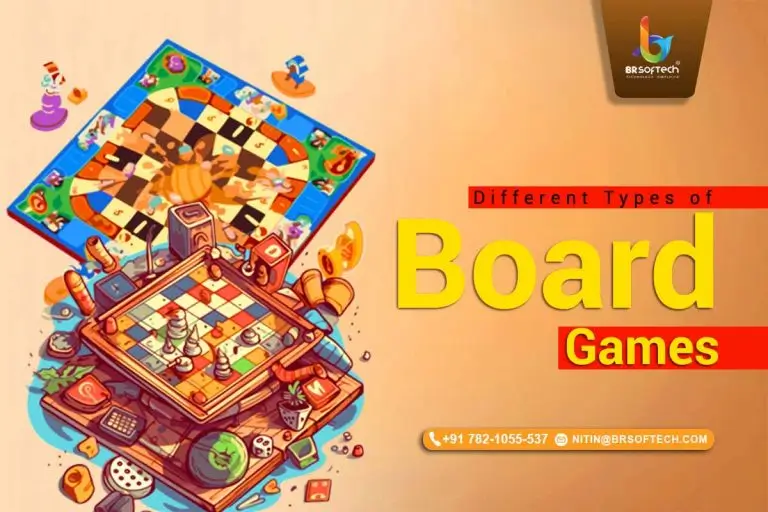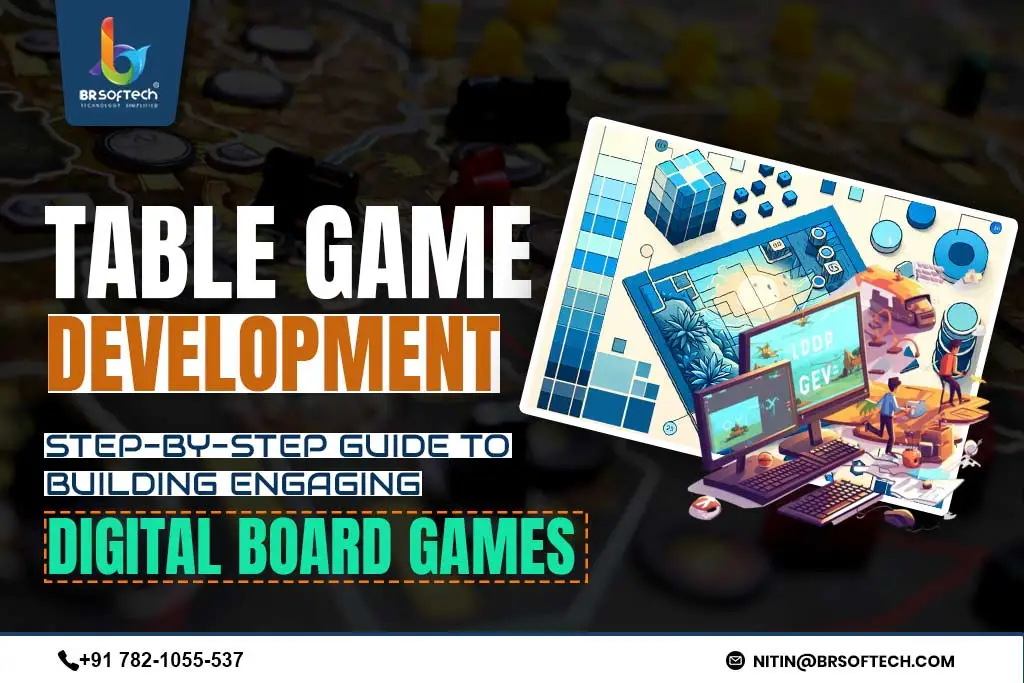Do you know how many types of board games exist in the market? Board games have come a long way from traditional to modern strategic games. If you understand the variety in board games, selecting the right match for you will be easy. Also, if you are a developer curating board games, knowing the priority of gamers will help you launch a better game. Technology in today’s world is way better than it was in previous decades. Hence, developers are open to many options in the current gaming landscape.
Whether you are a seasoned developer or a new player, this blog will introduce you to the exciting formats and fresh gameplay ideas in the gaming sector.
Key Takeaways:
By the end of this blog, you will not only understand the different types of board games, but you will also be able to integrate the latest trends into your board game, as we will discuss them as well. Developing a successful board game will require you to merge the industry’s latest trends.
Types of board games you will get to know in this blog:
- Strategy-Based Board Games
- Cooperative and Social Board Games
- Adventure and Thematic Board Games
- Mechanics-Based Board Games
- Casual and Party Board Games
Hybrid digital board games, the integration of technology, narrative-driven approaches, the emergence of legacy games, accessible design, and social gaming are among the trends that we will examine in detail.
Different Types of Board Games to Know in 2025
This list will illuminate all the significant kinds of board games people play in their leisure time, from strategy-based to casual and party games.
Strategy-Based Board Games
Strategy-based board games encompass planning, critical thinking, and long-term decision-making. These games necessitate players to analyze situations, anticipate opponents’ moves, and develop tactical plans to achieve victory. Unlike games governed by luck, strategy-based board games primarily depend on skills to determine the outcome. Some of the popular titles include:
- Chess
- Catan
- Risk
- Terraforming Mars
If you’re a fan of games like Catan, you’ll find plenty of strategy-heavy board games worth exploring.
Cooperative and Social Board Games
The primary aim of cooperative and social board games is to foster social cohesion among participants. These games emphasize collaboration and communication, which are fundamental elements in connecting individuals.
In such games, players collaboratively endeavor to accomplish a shared objective. These games foster problem-solving, trust, and strategic teamwork. Fine examples of such games are:
- Pandemic
- Forbidden Island
- Spirit Island
If you’re interested in diversifying your collection, consider trying games similar to Clue that also enhance social deduction and mystery-solving.
Adventure and Thematic Board Games
Storytelling, immersive worlds, and epic journeys constitute the fundamental elements of adventure and thematic board games. Through such games, participants are transported to intricately designed universes where their decisions significantly influence the results. Players get an engaging and narrative-driven experience.
Players undertake quests by exploring maps, confronting adversaries, and unlocking new narrative elements within adventure board games. These games integrate strategy, exploration, and character development. The best exemplars of such games include:
- Gloomhaven
- Tainted Grail
- Descent: Legends of the Dark
If you’re developing an immersive tabletop experience, check out this board game design guide for structured insights and expert tips.
Mechanics-Based Board Games
These types of board games focus primarily on the gameplay systems and rules that drive player interaction, unlike adventure board games, where a storyline drives the gameplay. Drafting, area control, worker placement, or deck-building are the core design mechanics around these games.
If you are someone who enjoys mastering systems, optimizing strategies, and engaging in thoughtful planning, these games should be on your list. Popular titles of mechanics-based board games are:
- Ticket to Ride
- Catan
- Dominion
- Carcassonne
Curious about how much it would cost to launch one of these systems-based games? Here’s a breakdown of the cost to develop a board game from concept to launch.
Casual and Party Board Games
Casual and party games are intended for the target audience seeking light entertainment and amusement. These games promote social engagement, feature straightforward rules, quick setup times, and brief gameplay durations, making them ideal for social gatherings, family evenings, or ice-breaking events. Some lighthearted fun games include:
- Pictionary
- Tambola
- Telestrations
Looking for more fun options for your next gathering? Here’s a list of the best family board games everyone can enjoy together
Board Game Trends to Watch
What is particularly noteworthy about board games in the year 2025 is their increased dynamism and diversity compared to previous periods. As technological advancements continue to progress, they are reflected in the evolution of board games, which are increasingly aligned with emerging innovations within the technological sector. This discussion will highlight some of the principal trends in the realm of board gaming that warrant attention.
Hybrid Digital Board Games & Tech Integration
Hybrid digital board games combine physical gameplay with digital technology. These games leverage AR, or digital tools, to track stats, reveal information, and add immersive features. These features enhance board games’ tactile, social aspect while simultaneously expanding what’s possible in terms of narrative, complexity, and interactivity.
Learn more about emerging styles, mechanics, and how to classify your game under the various types of board games for 2025.
Narrative-Driven and Legacy Games
Due to prevailing market trends, board games featuring narrative-driven gameplay generally demonstrate greater commercial success. Such games encompass branching storylines and campaign-style mechanics. These narrative-driven games monitor player decisions across multiple sessions, thereby providing evolving storylines, character development, and enduring consequences.
Inclusive and Accessible Design
Developing inclusive games remains an unmistakable priority for 2025. The design should surpass physical, cognitive, and cultural limitations. Success in this endeavor can be achieved by employing large, high-contrast elements; tactile indicators; straightforward, adaptable rules; and diverse representation within artwork and narratives.
Social & Connected Gaming
To enhance in-person and remote play, designers incorporate social features like app-driven scoring, cooperative challenges, and online leaderboards, among the biggest trends in 2025. These features make games more interactive and help build a community beyond the table.
Check out similar innovations in classic abstract games by exploring games like Go, which continue to inspire modern mechanics.
Final Words
From strategy-based board games like Chess and Catan to casual and party board games like Bingo and Pictionary, the category of board games is extensive. If you haven’t tried any of them, try these games today to improve your board game skills.If you feel like becoming a gaming entrepreneur by developing online board games like those presented above in the list, contact a popular board game development agency to start your entrepreneurial journey.
Frequently Asked Questions
Q1. What are the main types of board games? The main types include strategy-based, cooperative, adventure/thematic, mechanics-based, party/casual, and abstract games. Each provides unique gameplay mechanics and experiences.
Q2. Which board game types are best for beginners? Party, casual, and cooperative games are perfect for beginners because of their simple rules and shorter gameplay. Strategic board games like chess are less suitable for beginners.
Q3. How long does it take to develop a board game? On average, developing a board takes 3 to 6 months, depending on factors like the game’s complexity, features, and the launch platform.
Q4. How much does it cost to build a board game app? Development costs usually range from $8,000 to over $25,000, depending on game design, features, and the experience of the development team.
Q5. How can I create my own board game? You can create your own board game with these steps.
– Defining the game concept, rules, and mechanics.
– Design visuals, prototype gameplay
– Test with users
Finally, it can be developed digitally or physically with the help of a game development company.










